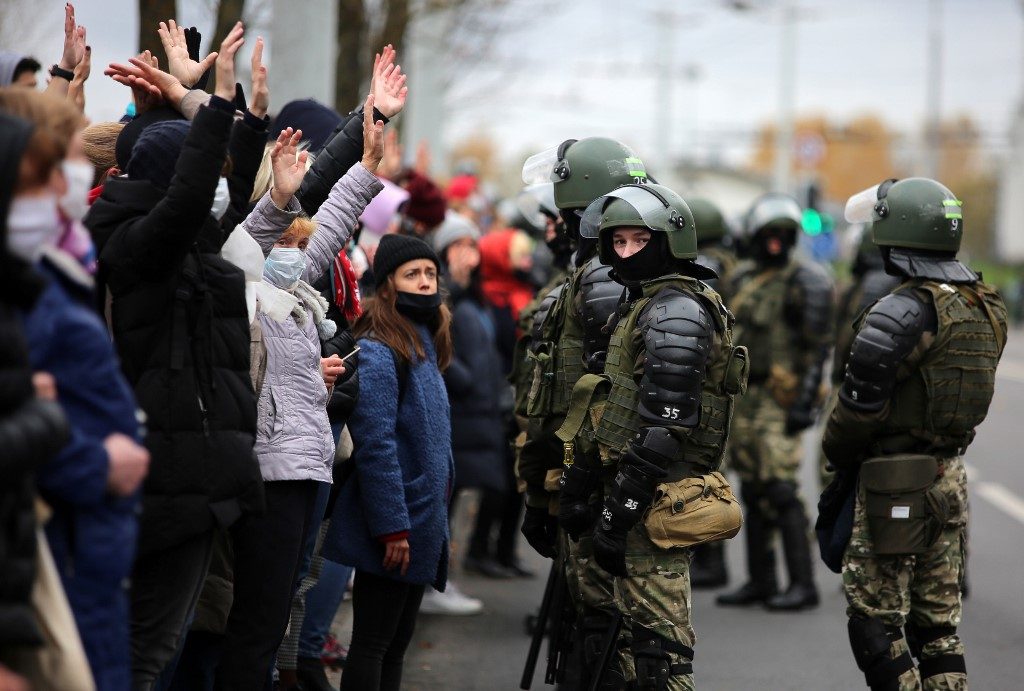SUMMARY
This is AI generated summarization, which may have errors. For context, always refer to the full article.

Belarus faced harsh criticism at the UN on Monday, November 2, with diplomats slamming arbitrary detentions and torture allegations in the response to months of protests against President Alexander Lukashenko.
During a review of Belarus’ rights record at the United Nations in Geneva, many diplomats urged Belarus authorities to halt the crackdown on demonstrators, who since August have been protesting Lukashenko’s disputed reelection.
A long line of country representatives, speaking in the room or remotely due to coronavirus restrictions, demanded that detained protesters be released, and urged investigations into all allegations of torture and ill-treatment.
“We call on the authorities to abstain from all repression against peaceful demonstrators, to immediately release anyone arrested arbitrarily, and to investigate all rights abuses in the post-election context,” Swiss ambassador Jurg Lauber said.
But during the so-called Universal Periodic Review (UPR) – which all 193 UN countries must undergo every 4 years – Belarus officials insisted authorities had reacted appropriately to “mass unrest” in the country.
An official with the Belarus interior ministry said via video link that authorities had faced “deliberate provocation towards police,” including by “trained fighters.”
The organizers behind “these unlawful acts clearly were supported everywhere by fake news and distortion of the facts (and) were using our people as cannon fodder,” he said.
‘Fraudulent’
The ex-Soviet nation has witnessed mass protests since the 66-year-old authoritarian leader claimed a landslide victory in August presidential elections that critics and Western leaders say was rigged.
Lukashenko – emboldened by Russia’s backing – has refused to step down despite persistent mass gatherings of Belarusians demanding he resign and hand power to main opposition candidate Svetlana Tikhanovskaya who has taken refuge in neighboring Lithuania.
Monday’s UPR came after hundreds of people were detained in Minsk over the weekend, as police dispersed protesters who had marched to a Stalin-era execution site to protest Lukashenko’s continued grip on power after 26 years.
Belarus Ambassador Yuri Ambrazevich did acknowledge his country faced some “issues on which work needs to be done,” but insisted that only with “respectful dialogue without external pressure, blackmail or conditions is it possible to make true progress.”
He stressed that Belarus was capable to restore stability on its own, and received backing from Russia and others who said the international community should not interfere.
Most countries were vocal in their criticism though.
“Belarus’ August 9 presidential elections were fraudulent, and we are deeply concerned by the ongoing use of violence, intimidation and repression against the Belarusian people,” US Ambassador Andrew Bremberg told the assembly via video call.
Canadian Ambassador Leslie Norton agreed, and called on Belarus to “take immediate measures to prevent all torture and cruel, inhuman, and degrading treatment or punishment,” and to investigate all allegations of such abuse and hold perpetrators accountable.
Like many others, she also called on the country to remove restrictions on journalists, and allow them to “work without fear of detention.” – Rappler.com
Add a comment
How does this make you feel?
There are no comments yet. Add your comment to start the conversation.